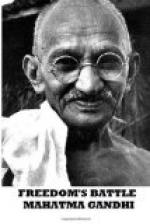Undoubtedly a cause must be grave to warrant the drastic method of national non-co-operation. I do say that the affront such as has been put upon Islam cannot be repeated for a century. Islam must rise now or ‘be fallen’ if not for ever, certainly for a century. And I cannot imagine a graver wrong than the massacre of Jallianwalla and the barbarity that followed it, the whitewash by the Hunter Committee, the dispatch of the Government of India, Mr. Montagu’s letter upholding the Viceroy and the then Lieutenant Governor of the Punjab, the refusal to remove officials who made of the lives of the Punjabis ‘a hell’ during the Martial Law period. These act constitute a complete series of continuing wrongs against India which if India has any sense of honour, she must right at the sacrifice of all the material wealth she possesses. If she does not, she will have bartered her soul for a ’mess of pottage.’
NON-CO-OPERATION EXPLAINED
A representative of Madras Mail called on Mr. M.K. Gandhi at his temporary residence in the Pursewalkam High road for an interview on the subject of non-co-operation. Mr. Gandhi, who has come to Madras on a tour to some of the principal Muslim centres in Southern India, was busy with a number of workers discussing his programme; but he expressed his readiness to answer questions on the chief topic which is agitating Muslims and Hindus.
“After your experience of the Satyagraha agitation last year, Mr. Gandhi, are you still hopeful and convinced of the wisdom of advising non-co-operation?”—“Certainly.”
“How do you consider conditions have altered since the Satyagraha movement of last year?”—“I consider that people are better disciplined now than they were before. In this I include even the masses who I have had opportunities of seeing in large numbers in various parts of the country.”
“And you are satisfied that the masses understand the spirit of Satyagraha?”—“Yes.”
“And that is why you are pressing on with the programme of non-co-operation?”—“Yes. Moreover, the danger that attended the civil disobedience part of Satyagraha does not apply to non-co-operation, because in non-co-operation we are not taking up civil disobedience of laws as a mass movement. The result hitherto has been most encouraging. For instance, people in Sindh and Delhi in spite of the irritating restrictions upon their liberty by the authorities have carried out the Committee’s instructions in regard to the Seditious Meetings Proclamation and to the prohibition of posting placards on the walls which we hold to be inoffensive but which the authorities consider to be offensive.”
“What is the pressure which you expect to bring to bear on the authorities if co-operation is withdrawn?”—“I believe, and everybody must grant, that no Government can exist for a single moment without the co-operation of the people, willing or forced, and if people suddenly withdraw their co-operation in every detail, the Government will come to a stand-still.”




